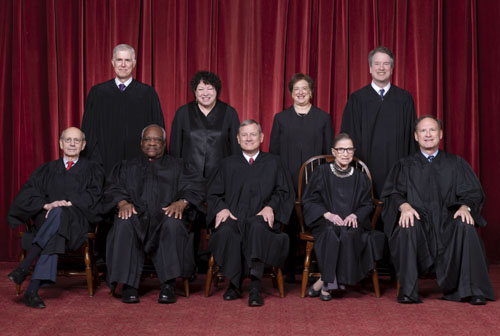by WorldTribune Staff, June 1, 2020
Congress shall make no law respecting an establishment of religion, or prohibiting the free exercise thereof; or abridging the freedom of speech, or of the press; or the right of the people peaceably to assemble, and to petition the government for a redress of grievances. — First Amendment to the U.S. Constitution
Chief Justice John Roberts joined the Supreme Court’s liberals on Friday to reject an emergency appeal by a California church that challenged limits on attendance at worship services imposed under Gov. Gavin Newsom’s coronavirus lockdown orders.

The decision failed to resonate as major news with the mainstream media but prompted one prominent conservative to write to his pastor (below) about the implications for Freedom of Religion as guaranteed by the First Amendment to the U.S. Constitution.
The high court turned away a request from the South Bay United Pentecostal Church in Chula Vista.
Roberts, Sonja Sotomayor, Ruth Bader Ginsburg, Elena Kagan and Stephen Breyer voted in favor of rejecting the church’s appeal. Justices Clarence Thomas, Samuel Alito, Neil Gorsuch and Brett Kavanaugh dissented.
South Bay United Pentecostal Church argued that limits on how many people can attend their services violate constitutional guarantees of religious freedom.
Newsom’s order limits congregations to 25 percent capacity or 100 attendees, whichever is lower. The church told the court its services typically attract 200 to 300 congregants.
“Although California’s guidelines place restrictions on places of worship, those restrictions appear consistent with the free exercise clause of the First Amendment,” Roberts wrote. “Similar or more severe restrictions apply to comparable secular gatherings, including lectures, concerts, movie showings, spectator sports, and theatrical performances, where large groups of people gather in close proximity for extended periods of time.”
Kavanaugh wrote in dissent that the restriction “discriminates against places of worship and in favor of comparable secular businesses. Such discrimination violates the First Amendment.” Kavanaugh pointed to supermarkets, restaurants, hair salons, cannabis dispensaries and other businesses that are not subject to the same restrictions.
The court also rejected an appeal from two churches in the Chicago area that objected to Gov. J.B. Pritzker’s limit of 10 worshipers at religious services. Before the court acted, Pritzker modified the restrictions to allow for up to 100 people at a time.
In a letter to his pastor, Free Press Foundation board member Carter Clews wrote:
I’m sure that you are fully aware now that this past week John Roberts led the Supreme Court in terminating Freedom of Religion.
According to his ruling, any governor at any time can shut down any church or churches if he deems them a threat to the health and safety of the general community.
It was done under the guise of protecting us all from the phony Covid plague.
But what it really means is that if you preach against homosexuality, you can be accused of endangering the health and safety of of “gays” — your church doors can be closed.
And, in fact, it goes even further.
If you preach that sinners go to hell, any group of miscreants can ban together, accuse you of endangering their health and safety (including their mental health) by spreading hate and creating a “hostile environment” — and you and your church can be shuttered forever.
I wish I were overstating the case.
But that is where we now are.
Intelligence Brief __________ Replace The Media
